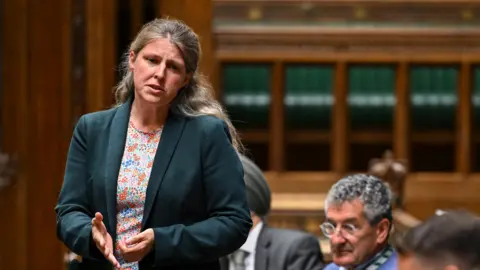In recent political events, Rachel Maskell, a prominent Labour MP from York Central, has made headlines following her suspension from the Labour Party for rebelling against the government’s welfare reforms. Maskell, along with three other dissenting MPs, was penalized for opposing proposed cuts to disability benefits, a controversial move that led to Labour leader Sir Keir Starmer reversing key legislative decisions. The suspension did not silence Maskell, who asserts her intent to continue advocating for her constituents as an independent MP.
Maskell’s decision to rebel stemmed from her deep concerns over welfare policies which she characterized as reminiscent of “Dickensian” cuts, asserting that these reforms ignore the realities faced by disabled individuals in today’s society. In a recent interview with the BBC, she expressed her anger over the government’s failure to heed backbench MPs during the bill’s formulation, which she believes ultimately led to the bill’s collapse just before a critical Commons vote. According to Maskell, the lack of dialogue from the government side indicated a disregard for the rich experiences that backbenchers contribute to policy discussions.
Minister Jess Phillips responded to these rebellions with an admonishment aimed at the MPs, suggesting that they should not be surprised by the repercussions of their persistent opposition to party line decisions. Phillips emphasized that there is a distinction between voicing concerns as a member of the government and openly criticizing it. She argued that a team-oriented approach is essential, declaring, “We do have to work as a team,” a sentiment reflecting the internal dynamics of Labour where loyalty seems increasingly paramount.
On a more structural note, Labour’s actions follow an apparent strategy to assert control within the party, especially as it seeks to stabilize after recent setbacks and policy reversals including the restoration of winter fuel allowances to pensioners. The change might be viewed as a corrective measure aimed at newer MPs who recently joined the party, reinforcing a message about the necessity of loyalty. Such discipline measures have led to mixed reactions among party members, with some loyalists agreeing with the punishment while others believe it unfairly punishes those willing to support potentially unpopular decisions within their constituencies.
The context of these suspensions reflects deeper tensions within the Labour Party, navigating its identity and direction under Starmer’s leadership. Maskell, undeterred by her independent status, made it clear that she would continue her advocacy for those underrepresented, particularly the disabled community, stressing, “If my constituents are telling me something, I want to be able to advocate.” She maintains that her central role has always been to serve and advocate for her constituents’ needs, a role she intends to uphold regardless of her party affiliation.
In the wake of the suspensions, fellow suspended MPs including Neil Duncan-Jordan, Brian Leishman, and Chris Hinchliff expressed their ongoing loyalty to Labour’s core values. Duncan-Jordan, for example, had publicly warned against the welfare changes, which he labeled “impossible to support” without a considerable realignment in party policy. The suspension of these MPs risks creating a chilling effect among Labour’s backbenchers, as several members now contemplate the potential ramifications of defying the party line.
In conclusion, while Maskell’s suspension seems aimed at curbing rebellion, it has also ignited broader discussions about party loyalty, dissent, and the dynamics of internal party governance. As Labour navigates its path forward, the voices of dissenting MPs like Maskell serve as a reminder of the diverse perspectives within the party, advocating for the voices of marginalized groups and the need for robust dialogue within parliamentary discourse.











